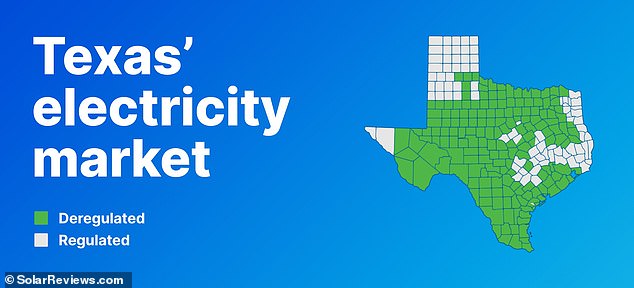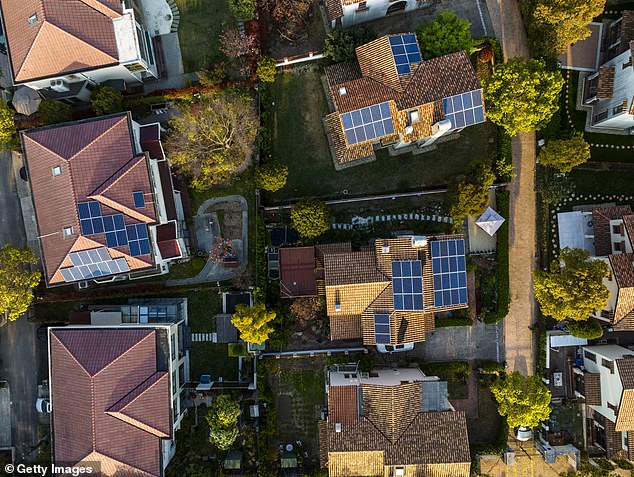Texans who installed solar panels are met with mounting debt and damage to their homes
Texans are finding out that outfitting their home with solar panels can come with huge bills, roof damage and even scams.
Solar energy companies often lure customers with advertisements that promise to lower their electricity costs while appealing to their desire to do good for the environment.
Adriana Morales fell victim to this type of advertising, but was especially unlucky because the company that installed her solar panels, HaHaSmart, has now gone bankrupt.
“I’m almost $60,000 in debt, and there’s no one to fix the panels because the company is closed now,” Morales said. The Dallas Morning News.
The single mother received one promise after another from the now-defunct company, which convinced her to take on debt to finance the project.
The now-defunct company that supplied solar panels to Adriana Morales has 17 customer complaints on the Better Business Bureau
“Their promises were that I would get money back through income taxes, that I wouldn’t pay the electric bill because the electric company would actually pay me, that it wouldn’t affect my credit score, and neither of those were true,” Morales said.
It’s not clear what Morales is referring to when she said she would get money back from “the income tax,” as Texas has no such tax nor any state-level tax breaks associated with solar energy.
What she could be referring to is the 30 percent federal tax credit that consumers are entitled to if they install solar panels.
In Morales’ case, if her installation cost her a total of $60,000, she could theoretically claim an $18,000 tax credit when she filed the following year.
As for her claim that the electric company is paying her, it is rooted in some truth.
First, your electricity supplier must have a so-called net metering program.
Net metering is a billing method that allows customers to be paid via solar credits or cash for the electricity they generate and return to the grid.

This map shows which Texas counties have deregulated or regulated electricity markets. Morales lives in an unregulated market, which means she must look to private providers rather than rely on a public utility
Morales lives in Dallas, a deregulated electricity market. This means looking for retail providers and choosing one that offers net metering.
Morales said the fact that she would have to go into debt before potentially seeing a return on her investments years later was not made clear to her.
HaHaSmart has 17 customer complaints on its Better Business Bureau profile, with many people describing similar problems to Morales.
The most recent complaint was dated February 13, 2024.
‘We bought solar panels from Haha Smart and they were installed in September 2023. It is now February 2024 and they are not generating any electricity,” someone wrote.
They continued, “I have tried calling at least two of their numbers but their voicemail is NOT ON. I’m starting to think this company is a scam and will initiate legal proceedings if this isn’t resolved soon.’
Unfortunately, shady business practices have been observed at several solar companies in Texas.

Kim Kromdyk of Garland, northwest of Dallas, had a $97,000 lien filed against her over solar panels she never purchased
Kim Kromdyk of Garland, northwest of Dallas, had a lien totaling $97,000 filed against her for solar panels she never purchased.
All she did, she said, was run a credit check to see how much they had cost her. Nevertheless, Solar Mosaic allegedly hit her with the lien and charged her $368 per month.
It was only until CBS News Texas drew attention to her predicament that the company had withdrawn the lien.
Martha Ruiz, a neighbor of Morales, owns two houses with solar panels: one at her home and one at her daughter’s.
The company that installed the panels damaged its roof, which is now collapsing, she said.
The company didn’t return her calls, so she resorted to her homeowner’s insurance. That only put her in more debt because of the $3,500 deductible on her policy.
Her daughter’s electricity bill has not gone down because the panels stopped working, and the company that supplied them is also bankrupt.
Like Morales, she is paying for something that no longer works.

One expert said consumers should take their time making a decision when it comes to solar energy because of the large investment
Ryan Barnett, senior vice president of policy and market development at Palmetto, a climate technology company, said there are ways not to end up in precarious situations like this.
It requires proper due diligence on companies and asking lots of questions to find potential red flags.
“For a consumer, you want to look at his or her time in business, his or her record, the election contractor licensing in the state of Texas, and you can check with the attorney general’s office or with the Texas licensing Better Business Bureau inquire whether there are any complaints or outstanding complaints. or problems with a contractor,” he told The Dallas Morning News.
He continued: “Having local credentials is very important. If the installer cannot provide this, that is a red flag. If the dealer can’t give them, or they direct you somewhere else, or try to rush you past that line of questions, that’s a red flag.”
Overall, Barnett says taking the time to make a huge investment like solar energy is the wisest course of action.
